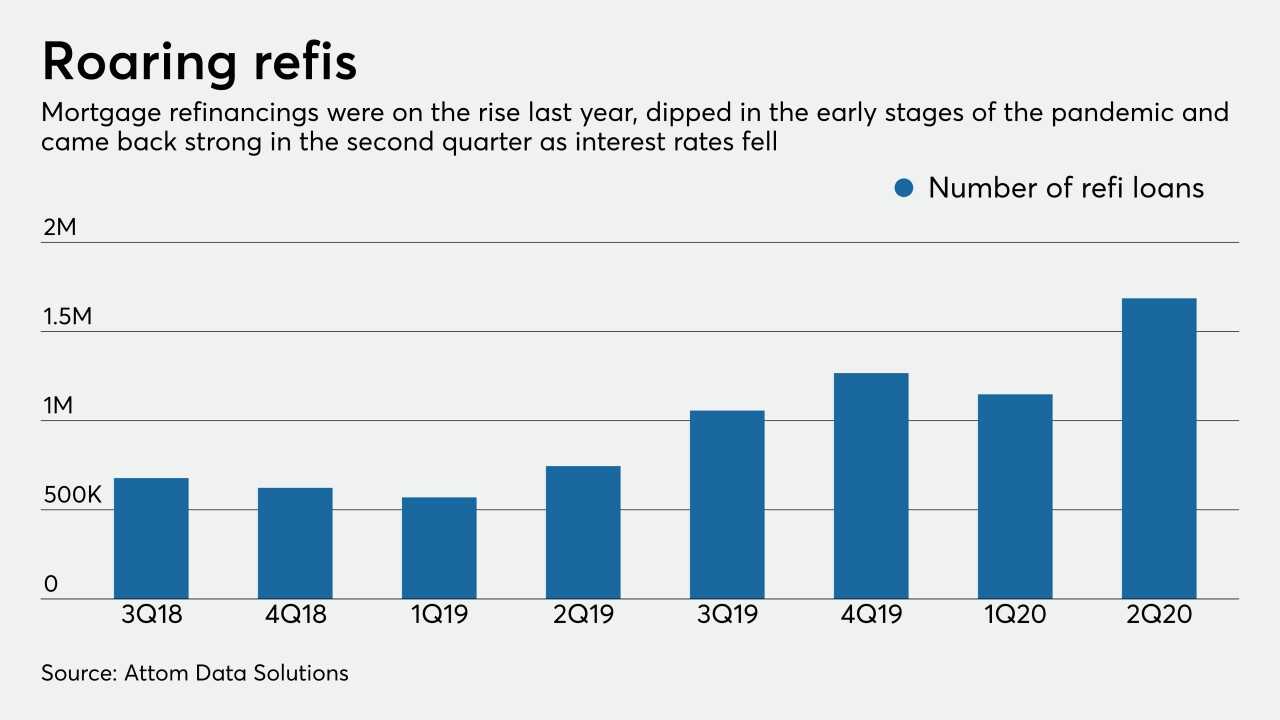-
The agency issued a proposal moving the compliance date for the Qualified Mortgage rule revamp to October 2022.
March 3 -
While its net income declined annually for the second consecutive year, CEO Hugh Frater touted Fannie Mae’s resiliency in a record year for providing mortgage liquidity.
February 12 -
The proposal would require the government-sponsored enterprises to craft resolution plans similar to regulations imposed on the largest U.S. banks.
December 23 -
Many have assumed the high court would rule that presidents can fire the Federal Housing Finance Agency director at will. But during oral arguments in a case challenging the agency’s structure, some justices suggested they could stop short of such a decision.
December 9 -
Fannie hasn't completed any credit risk transfers to private investors since the second quarter. Some experts worry the decision — likely spurred by the company’s concerns about a recent capital regulation — could put the mortgage giant on unsteady footing.
December 3 -
The former FDIC chief oversaw the resolution of hundreds of failed banks during the financial crisis and knows how to build relationships with regulators. Those skills could be crucial in helping Fannie exit federal control.
November 9 -
One of the top banking regulators during the 2008 financial crisis could have a hand in nudging Fannie Mae out of conservatorship.
November 5 -
The agency confirmed that loans backed by Fannie Mae and Freddie Mac can continue avoiding debt-to-income limits as the bureau completes a revamp of the Qualified Mortgage standard.
October 20 -
HSBC, Bank of the West and Fannie Mae are among those offering green mortgage bonds, financing commercial clients’ efforts to rein in carbon emissions and developing other novel products that help customers tackle environmental challenges.
October 6 -
The Financial Stability Oversight Council said the mortgage giants may need a bigger capital cushion than their regulator has proposed, but stopped short of designating them as “systemically important financial institutions.”
September 25 -
The agency’s report on mortgage data submitted by lenders identified persistent disparities between white borrowers and minorities in denial rates and pricing. Some observers say the bureau should have been more explicit as the nation wrestles with systemic racism.
September 24 -
Fannie Mae and Freddie Mac have been slammed for planning an additional refinancing charge to cover COVID-related losses, but the head of the Federal Housing Finance Agency defended the policy in House testimony.
September 16 -
The Federal Housing Finance Agency's proposal could undermine the companies’ mission to support the housing market and penalize consumers in underserved communities, industry and consumer groups say.
September 8 -
The agency’s plan to extend the "qualified mortgage" stamp of approval to more loans could help lenders that rely on alternative data and cushion the blow of other QM changes for Fannie Mae and Freddie Mac.
September 2 -
Why PayPal just deposited $50 million in tiny Optus Bank; ex-Bank of America employees allege 'extreme pressure' to sell credit cards; the Citi snafu may bring fresh scrutiny to custodial banks; and more from this week's most-read stories.
August 28 -
Refinancing has been one of the bright spots in a difficult year for lending, and the industry has concerns that a fee to be imposed by Fannie Mae and Freddie Mac could slow down the business.
August 28 -
Both the Federal Housing Finance Agency and Federal Housing Administration are extending relief for homeowners and renters due to the pandemic crisis.
August 27 -
The mortgage giants were criticized earlier this month for a plan to charge an "adverse market fee" to protect against losses resulting from the pandemic.
August 25 -
Lenders initially won't be able to pass on the cost of the Federal Housing Finance Agency's "adverse market fee" to borrowers whose rates on GSE-backed mortgages and refinances are already locked in.
August 20 -
The new “adverse market fee” for refinanced mortgages resembles steps the companies took to combat the 2008 mortgage crisis. But critics charge it isn’t necessary and will hurt borrowers’ ability to tap into low rates.
August 13



















